
Fiji has experienced many coups recently,in 1987,2000,and 2006. Fiji has been suspended various times from the Commonwealth of Nations,a grouping of mostly former British colonies. It was readmitted to the Commonwealth in December 2001,following the parliamentary election held to restore democracy in September that year,and has been suspended again because of the 2006 coup,but has been readmitted a second time after the 2014 election. Other Pacific Island governments have generally been sympathetic to Fiji's internal political problems and have declined to take public positions.
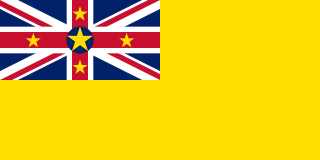
The politics of Niue take place in a framework of a parliamentary representative democratic dependency,whereby the Chief Minister is the head of government,and of a non-partisan system. Niue is self-governing in free association with New Zealand and is fully responsible for internal affairs. New Zealand retains some responsibility for external affairs,in consultation with Niue. The Niue Constitution Act 1974 (NZ) vests executive authority in His Majesty the King in Right of New Zealand and the Governor-General of New Zealand. The constitution specifies that in everyday practice,it is exercised by a Cabinet of the Premier of Niue and three other ministers. The premier and ministers must be members of the Niue Assembly,the nation's legislative assembly. The Judiciary is independent of the executive and the legislature.

Winston Raymond Peters is a New Zealand politician who has been the leader of New Zealand First since it was founded in 1993. He was re-elected for a fifteenth time at the 2023 general election,having previously been a member of Parliament (MP) from 1979 to 1981,1984 to 2008 and 2011 to 2020. Peters has served as the 13th deputy prime minister of New Zealand and 25th minister of foreign affairs since November 2023.

Rewiti Pomare Kingi "Pita" Paraone was a New Zealand politician and chairman of the Waitangi National Trust Board. He was a member of the New Zealand First party.
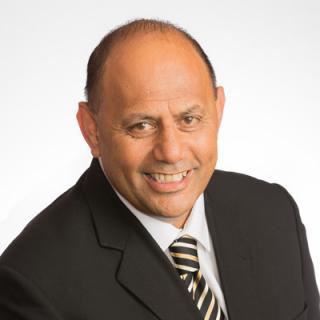
William Wakatere Jackson is a New Zealand politician and former unionist,broadcaster and Urban Māori leader. He was a Member of Parliament for the Alliance from 1999 to 2002 and is currently a Labour Party MP,having been re-elected in 2017.

Maryan Street is a New Zealand unionist,academic and former politician. She was president of the New Zealand Labour Party from 1993 to 1995 and a Labour Party list member of the New Zealand House of Representatives from 2005 until 2014.

Aupito Tofae Su'a William Sio is a politician who became a member of the New Zealand House of Representatives on 1 April 2008 for the Labour Party as a list MP. From the November 2008 election to 2023,he represented the Māngere electorate.

Timothy John Groser is a New Zealand former politician and diplomat. A member of the New Zealand National Party,Groser was a Member of Parliament between 2005 and 2015. He held the offices of Minister of Trade,Minister of Conservation,and Minister for Climate Change in the Fifth National Government.

Todd Michael McClay is a New Zealand politician and former ambassador. He is the Member of Parliament for Rotorua. He was previously an ambassador for the Cook Islands and Niue to the European Union.

Rongotai is a New Zealand electorate,returning a single member to the New Zealand House of Representatives. The current MP for Rongotai is Julie Anne Genter of the Green Party. She has held this position since the 2023 general election.

Wairarapa is a New Zealand parliamentary electorate. It was first created in 1858 and existed until 1881. It was recreated in 1887 and has since existed continuously. The current Wairarapa electorate MP is Mike Butterick.

Sir Toke Tufukia Talagi was a Niuean politician,diplomat,and statesman. He served as Premier of Niue from 2008 to 2020.

Paul Jonathan Goldsmith is a New Zealand historian and politician. The biographer of several leading right-wing political and business figures,he was first elected a list member of the New Zealand House of Representatives for the National Party at the 2011 election.
Joanne Kowhai Hayes is a former New Zealand politician who served as a New Zealand National Party List MP in the New Zealand House of Representatives from 2014 to 2020.
Alastair Oliver Scott is a New Zealand politician who was elected to the New Zealand parliament at the 2014 general election as a representative of the New Zealand National Party.
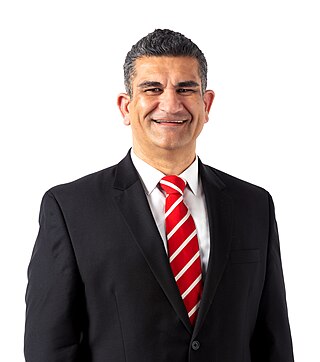
Tahere Paul Eagle is a New Zealand politician and former member of the New Zealand House of Representatives for the Rongotai electorate from 2017 to 2023. He was a Wellington City Councillor from 2010 to 2017 and was the first person of Māori descent to be Deputy Mayor of Wellington,but was defeated in a landslide when he sought the mayoralty as an independent candidate in 2022.

Kieran Michael McAnulty is a New Zealand politician. He was first elected to the New Zealand House of Representatives in 2017,representing the New Zealand Labour Party. He was the Member of Parliament (MP) for Wairarapa between 2020 and 2023,and is currently a list MP.
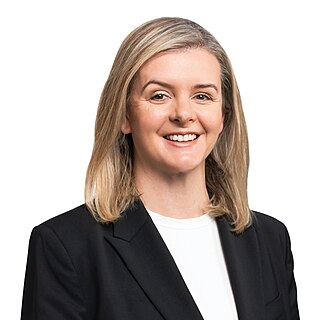
Camilla Vera Feslier Belich is a New Zealand lawyer,trade unionist and politician. She has been a Member of Parliament,representing the New Zealand Labour Party,since 2020.
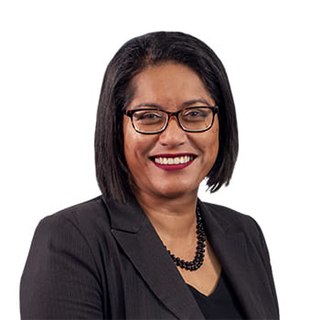
Barbara Rachael Fati Palepa Edmonds,is a New Zealand politician. She was elected as the Member of the New Zealand Parliament for Mana,representing the Labour Party,in 2020. She served as the Minister of Internal Affairs,Minister for Pacific Peoples,Minister of Revenue and Minister for Economic Development in the final year of the Sixth Labour Government.
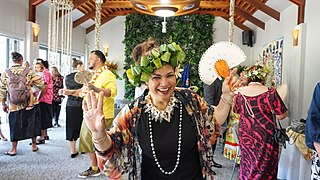
Pasifika New Zealanders are a pan-ethnic group of New Zealanders associated with,and descended from,the indigenous peoples of the Pacific Islands outside of New Zealand itself. They form the fourth-largest ethnic grouping in the country,after European descendants,indigenous Māori,and Asian New Zealanders. Over 380,000 people identify as being of Pacific origin,representing 8% of the country's population,with the majority residing in Auckland.


















